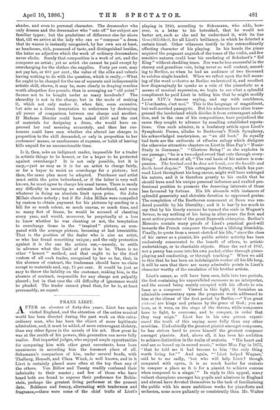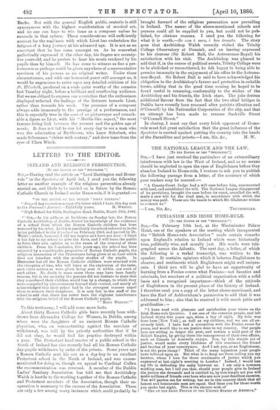FRANZ LISZT.
AFTER an absence of forty-five years, Liszt has again visited England, and the attention of the entire musical world has been directed during the past week on this extra- ordinary man, who has been the object of more legitimate admiration, and, it must be added, of more extravagant idolatry, than any other figure in the annals of his art. How great he -was at the zenith of his powers, this generation can never fully realise. But impartial judges, who enjoyed ample opportunities for comparing him with other great execntants, have been unanimous in according him the foremost place of all. Schumann's comparison of him, under several heads, with "Thalberg, Henselt, and Clara Wieck, is well known, and in it Liszt is certainly placed more often at the top than any of the others. Von Billow and Tansig readily confessed their inferiority to their master ; and few of those who have heard both are found to express their preference for Rubin- stein, perhaps the greatest living performer at the present date. Boldness and frenzy, alternating with tenderness and fragrance,—these were some of the chief traits of Liszt's playing in 1840, according to Schumann, who adds, how- ever, in a letter to his betrothed, that he would not barter art, such as she and he understood it, with its fine Gemiithlichkeit, for all Liszt's brilliancy, in which he detected a certain tinsel. Other witnesses testify to the extraordinarily affecting character of his playing. In his hands the piano acquired the poignant anguish of the tones of the violin, and few sensitive natures could hear his rendering of Schubert's "En King" without shedding tears. Nor was he less successful in the stormy and grandiose vein, being never so well content, accord- ing to Berlioz, as when he had an audience of two thousand to subdue single-handed. When we reflect upon the full mean- ing of the word orchestra as Berlioz understood it, and recollect how disparagingly he speaks as a rule of the pianoforte as a means of musical expression, we begin to see what a splendid compliment he paid Liszt in telling him that he might modify Louis XIV.'s famous saying, and say with confidence, "L'orchestre, c'est moi." This is the language of magnificent, but well-merited panegyric. But his admirers have often trans- gressed the borderland which divides it from extravagant adula- tion, and in the case of his compositions, have prejudiced the cause they sought to advance by assailing established reputa- tions. One such admirer, in a laudatory article upon Liszt's Symphonic Poems, alludes to Beethoven's Ninth Symphony, his acknowledged masterpiece, as "an old boot." In equally bad taste are the outbursts of effusive eulogy which disfigure the otherwise attractive chapters on Liszt in Miss Fay's "Music- Study in Germany." "Glorious Being !" so she explodes in one passage ; "he is a two-edged sword that cuts through every- thing:' And worst of all, "The real basis of his nature is com- passion. The bruised reed he does not break, nor the humble and docile heart despise?' This outrageous flattery, which has pur- sued Liszt throughout his long career, might well have unhinged his nature, and it is therefore greatly to his credit that he should have used his unique personal influence and exalted pro- fessional position to promote the deserving interests of those leas favoured by fortune. His life abounds with instances of splendid generosity and chivalric devotion to oppressed genius. The completion of the Beethoven monument at Bonn was ren- dered possible by his liberality ; and it is har3ly too much to say that by his timely succour he turned the scale in Wagner's favour, to say nothing of his being in after-years the first and most active promoter of the great Bayreuth enterprise. Berlioz's Memoirs contain many proofs of Liszt's practical good-will towards the French composer throughout a lifelong friendship. Finally, to quote from a recent sketch of his life," since the close of his career as a pianist, his public artistic activity has been exclusively consecrated to the benefit of others, to artistic undertakings, or to charitable objects. Since the end of 1847, not a penny has come into his own pocket, either through piano- playing and conducting, or through teaching." When we add to this that he has been an indefatigable worker all his life long, it will be seen that there are many admirable points in Liszt's character worthy of the emulation of his brother artists.
Liszt's career, as will have been seen, falls into two periods, the first containing his unparalleled successes as an interpreter, and the second being mainly occupied with his efforts to win fame as a composer. Viewed in this light, it furnishes an admirable commentary upon the pregnant words addressed to him at the climax of the first period by Berlioz :—" You great virtuosi are kings and princes by the grace of God ; you are born, as it were, on the steps of the throne, while composers have to fight, to overcome, and to conquer, in order that they may reign." Liszt has in his own person experi- enced the truth of this saying more fully than any other musician. Undoubtedly the greatest pianist amongst composers, he has striven hard to prove himself the greatest composer amongst pianists. And, above all, it has been his ambition to achieve distinction in the realm of oratorio. "His heart and soul are so bound up in sacred music," writes Miss Fay in 1873, that he told me it had become to him the only thing worth living for.'" And again, " • Liszt helped Wagner,' said he to me sadly, 'but who will help Liszt P though compared with opera, it is as much harder for oratorio to conquer a place as it is for a pianist to achieve success when compared to a singer.'" In reply to this appeal, many valiant champions amongst his pupils and admirers in England and abroad have devoted themselves to the task of familiarising the public with his more ambitious works for pianoforte and orchestra, none more gallantly or consistently than Mr. Walter
Bache. But with the general English public, oratorio is still synonymous with the highest manifestation of musical art, and no one can hope to win fame as a composer unless he succeeds in that sphere. These considerations will sufficiently account for the readiness with which Liszt has undertaken the fatigues of a long journey at his advanced age. It is not as an execntant that he has come amongst us. As he somewhat pathetically expressed it the other day, his fingers are seventy- five years old, and he prefers to hear his music rendered by his pupils than by himself. He has come to witness as fine a per- formance as perhaps could be given anywhere of a representative specimen of his powers as an original writer. Under these circumstances, and with our honoured guest still amongst us, it would be ungracious to enter upon any detailed criticism of his St. Elizabeth, produced on a scale quite worthy of the occasion last Tuesday night, before a brilliant and overflowing audience. But we are obliged to express our conviction that the enthusiasm displayed reflected the feelings of the listeners towards Liszt, rather than towards his work. The presence of a composer always adds immensely to the prestige of a performance, and this is especially true in the case of so picturesque and remark- able a figure as Liszt, with his "Merlin-like aspect," the most famous living link between the present and the golden age of music. It does not fall to our lot every day to see a man who won the admiration of Beethoven, who knew Schubert, who made Schumann "shiver with ecstasy," and drew tears from the eyes of Clara Wieck.



































 Previous page
Previous page